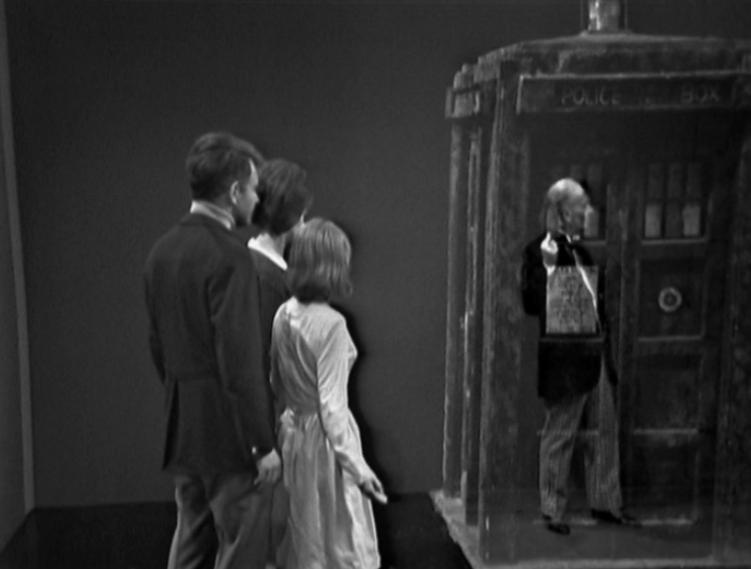The Space Museum is the seventh serial of the second season in the British science fiction television series Doctor Who, which was first broadcast in four weekly parts from 24 April to 15 May 1965. The story is set on the planet Xeros, a subjugated planet in the Morok Empire, now home to a vast museum and a young, rebellious population.
Plot

The TARDIS arrives near a vast Space Museum on the planet Xeros, but has jumped a time-track. The First Doctor, Ian Chesterton, Barbara Wright and Vicki have a series of bizarre experiences as they venture outside and into the Museum â€" not least that they see but cannot be seen by the militaristic Moroks who run the museum, or the servile indigenous Xerons who work for them. The museum contains fascinating exhibits, including a Dalek shell, but the most worrying is the four travellers themselves encased and on display. Quite soon afterward the time track slips back and, though the exhibits of the TARDIS and the four travellers vanish, they still find themselves inside the Museum.
The head of the Moroks, Lobos, is a bored and desperate museum administrator and colony governor, who reflects sourly that the glories of the Morok Empire are past. Like Rome, the Empire became decadent and then declined. The Moroks have found the TARDIS and now start tracking down the occupants who have, as usual, become separated. The Doctor is the first to be found, but evades their interrogation tactics.
Meanwhile, Vicki has made contact with the Xerons and, hearing of their enslavement, aids them in their plans to stage a revolution. They attack the Morok armoury and Vicki outwits its controlling computer. With their new weapons, the Xerons are able to begin a revolution, which slowly takes hold.
Ian has meanwhile freed the Doctor from Lobos, who had begun the process of freezing him and turning him into an exhibit. Ian and the Doctor are quickly recaptured by the Morok guards, and Barbara and Vicki are captured shortly thereafter. With all four held prisoner in the Museum, it looks like the time track prediction of their future as museum exhibits will soon be realised after all.
Help comes from the Xeron revolutionaries, who kill Lobos and the other Morok captors. The Xerons then go about destroying the hated Museum as the TARDIS crew slips away. They take with them a time/space visualiser as a souvenir. On the planet Skaro, their departure is noted by the Daleks.
Production

Episode 1 begins with a brief reprise of The Crusade episode 4, which is currently the only surviving film footage of that episode.
Cast notes
William Hartnell was on holiday during the recording of episode 3. Thus, he is only seen in the reprise of episode 2.
This story features a guest appearance by Jeremy Bulloch - see also Celebrity appearances in Doctor Who. Bulloch later played Hal in The Time Warrior. Ivor Salter later played Odysseus in The Myth Makers and Sergeant Markham in Black Orchid. Peter Craze is the younger brother of Michael Craze, who played companion Ben Jackson from 1966 to 1967. Peter later played Du Pont in The War Games and Costa in Nightmare of Eden.
Broadcast and reception
In 2009, Mark Braxton of Radio Times noted that The Space Museum "kicks off so well", but did not take the opportunity to discuss ideas such as predestination and also boasted a predictable, "poorly acted" conflict and many implausibilities. However, he felt that the serial showcased Vicki's "vibrant" character and the Dalek joke was "one of the few elements that make this rather tedious traipse memorable". Reviewing the DVD release, SFXâ€â€â€Š'​â€s Nick Setchfield described The Space Museum as offering a "killingly dull environment in which to stage an unengaging take on Who's eternal 'rebels vs despots' formula", despite the "lovely fourth-dimensional weirdness" of the first episode and the "refreshing" Moroks who were reminiscent of Douglas Adams' work. Jonathan Wilkins of Dreamwatch also called the first episode "great" and the rest "dull, bog-standard Who" which were "not terrible but ... not terribly exciting either, as it plods rather than races towards a deeply unsatisfactory climax".
Graham Kibble-White, writing for Doctor Who Magazine, said that the first episode falsely set the audience up for "three more weeks of high-concept plotting", when in fact the Doctor dismissed the time travel problems and the rest was "dreary" except for some of Hartnell's charm. DVD Talk's John Sinnott was more positive towards the story, writing, "there were a lot of great plot points that served to keep viewers guessing, and some subtle comedy that really added a lot to the whole show". He also complemented the light touches of humour. In 2010, io9's Charlie Jane Anders listed the cliffhanger of the first episode as among the best in the programme.
Commercial releases

In print
A novelisation of this serial, written by Glyn Jones, was published by Target Books in January 1987.
Home media
This story was released alongside the surviving episodes of The Crusade on VHS in 1999. The audio soundtrack was released with narration from Maureen O'Brien on CD in May 2009. It was released on DVD in a box set with The Chase on 1 March 2010.
References
External links
- The Space Museum at BBC Online
- The Space Museum at Doctor Who: A Brief History Of Time (Travel)
- The Space Museum at the Doctor Who Reference Guide
Reviews
- The Space Museum reviews at Outpost Gallifrey
- The Space Museum reviews at The Doctor Who Ratings Guide
Target novelisation
- On Target â€" The Space Museum

Posting Komentar